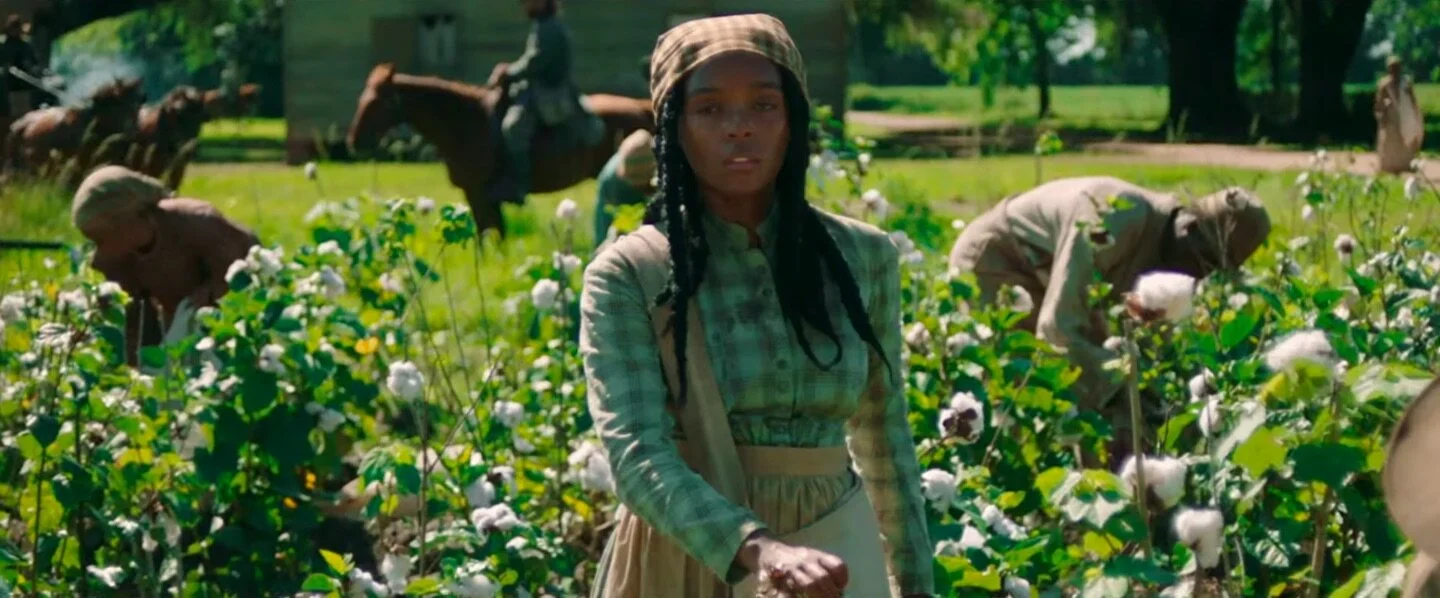Well, well, well. I’m a liar. I said I was going to be on time with my next Spooktober: 2 Spook 2 Tober post, but you know what? It’s 2020, and there are no rules, so these are just going up when they go up. Deal with it.
Today, in week 5 of Spooktober (3 days late), we’re going to take a look at Antebellum, the movie that everyone wanted to see because it stars Janelle Monae and was advertised as being from the producers of Us and Get Out. Producers. Not director. Not writer. That should be the first red flag here.
The posters also featured the tagline “If it chooses you, nothing can save you,” which is creepy, sure. But what does that mean? I’ll get to it at the end of this post. Spoilers to follow. But honestly, if you’ve seen the trailer, you know what happens. It’s already been spoiled. More on that too. Here we go.
Antebellum starts on a plantation where a few slaves (including Monae) are attempting to escape. We immediately get a lot of violence and horror right up front. This isn’t totally unheard of for slave narratives, and sadly, I feel like viewers are desensitized to it at this point, which I think is part of what this movie is trying to point out. Nonetheless, I always feel a little uncomfortable watching people get tortured. I love horror, but torture, especially torture based on real things that happened to real people, has never been my thing.
Anyway, at some point, after bombarding us with slave torture, we get to the “twist.”
I’m putting “twist” in quotes here because if you’ve seen the trailer, you know the twist already. Whoever was in charge of advertising this movie really blew it. All this movie has going for it was the “twist,” but when you know it already, you’re just sort of waiting for the reveal. And there’s not much else going on in this movie aside from that.
So what is the twist, you might wonder if you haven’t seen this trailer. Well, we get a flashback to Monae’s character Veronica Henley before she was on this plantation, and it turns out all of this is happening in current times. The next third of the movie is showing us what Veronica’s life is like in the contemporary world. She has a loving and supportive family, and cute little daughter, and she’s famous for being an outspoken Black feminist.
At this point in the movie, I started thinking about all the things this movie was ALMOST doing but didn’t quite do. We see Veronica giving some speeches about fighting for your rights, but it’s all very abstract and buzzword-y without really meaning anything. Just throwing in the word “patriarchy” a whole bunch doesn’t make for inspiring rhetoric. She’s also only donating a small portion of her book profits to supporting schools. So I thought maybe this movie was trying to say something about being all words and no action. About performative activism. But no, it didn’t really go there.
Instead, while at a conference in New Orleans, Veronica gets snatched up by an evil white woman who has somehow been contacting her via FaceTime but not really saying anything of consequence. I kept shouting at the screen, “Why are you taking this bitch’s calls?” But she does take her calls, and she ends up kidnapped and taken to this modern day plantation… and now we’re back up to speed for the final third of the movie, which is all about her trying to escape.
Evil white supremacist Jena Malone
So there aren’t really any surprises in this movie. It’s basically on the trajectory you assume it will be on. You know from the moment Jena Malone’s character is introduced that she’s going to be the one to snatch Veronica up and bring her to this plantation. You know that eventually Veronica is going to break free. You know that all of the people running this plantation are evil white supremacists. All you can do now is watch and see it unfold and be disappointed when in unfolds in a way that’s less fulfilling than what you imagined in your head.
This movie had the potential to say some really interesting things. About performative activism, yes. But also about politics and racism in contemporary American society. If it’s commenting on any of these things, it’s only in the most simplistic way. It’s so frustrating because you can see the potential, but it’s just not there.
This movie should have been horrifying. The concept of slavery is horrifying. The idea that it could easily still be happening now in America is horrifying. The movie did not make the best use of that horror.
Which brings me back to the movie’s “catch phrase.” To remind you, it’s “If it chooses you, nothing can save you.” Let’s talk about how inaccurate this is. First of all, what is “it”? Jena Malone’s character says herself that she is the one who personally handpicks all of the slaves on the plantation. I get that it’s scarier to say “it” rather than “she,” but that’s just not what’s happening in this movie. Also, “nothing can save you”? Turns out a quick 911 call and a boatload of police officers can save you. Interesting.
If you read all of this and still want to spend the $20 it costs to rent Antebellum on VOD, have at it. It’s available to watch now. This movie was slightly entertaining and I’m glad I checked it out, but I would advise waiting until it’s a little bit cheaper. Or maybe even free with a subscription service. But knock yourself out.
I’ll be back later this week for more Spooktober, probably. You know how it is.




